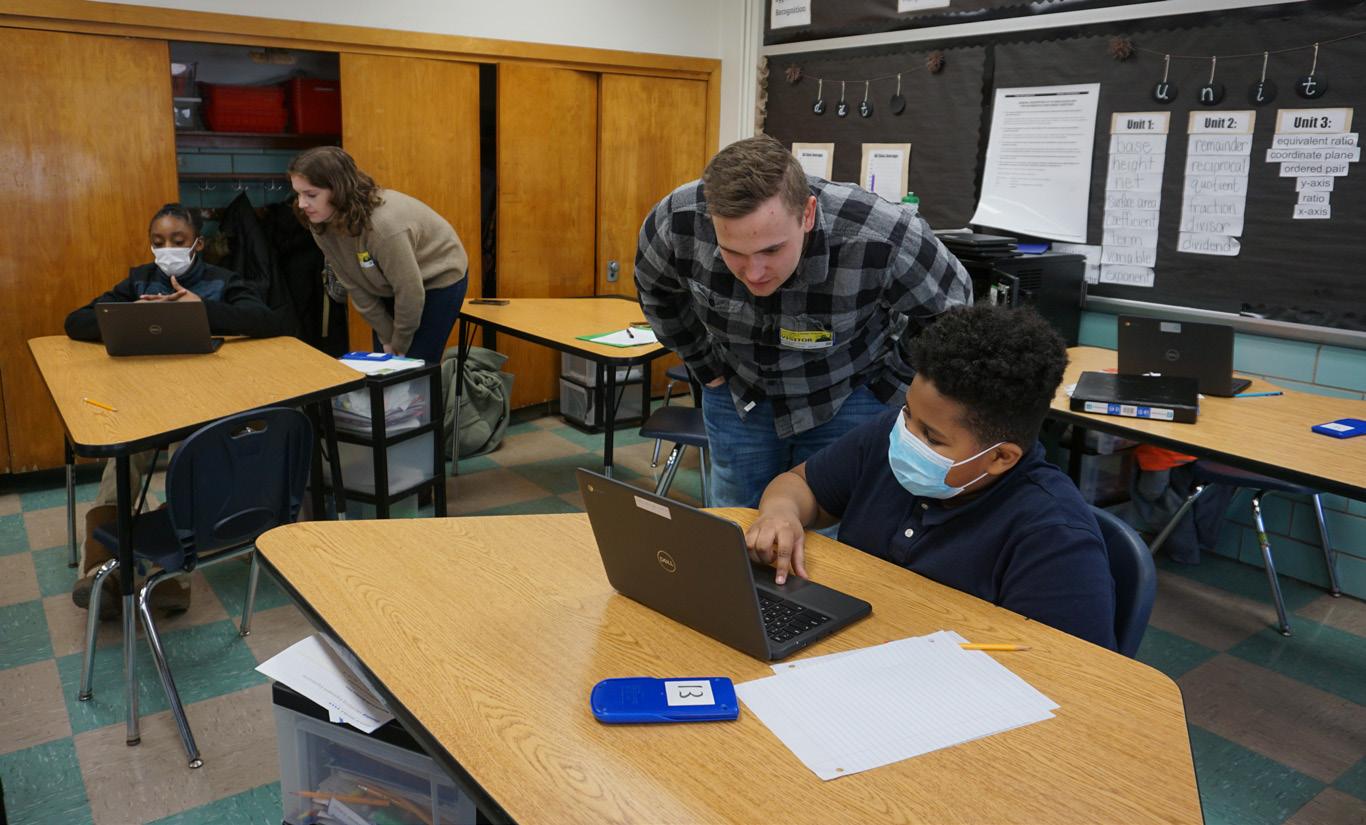
19 minute read
Sr. Mary Noël Kernan
IN MEMORIAM Sister Mary Noël Kernan Remembered for Role as Co-Founding Director of the National Catholic Center for Holocaust Education
When Sister Mary Noël Kernan was returning to the United States from volunteer service in Korea in early 1987, she decided to stop in Israel to visit with her friend and fellow Sister of Charity of Seton Hill Gemma Del Duca. Sister Gemma had been living and working in Israel since the 1970s, and Sister Mary Noël was interested in learning more about her work and life in the country. So when Sister Gemma returned to the United States later that year with an idea to start a Holocaust education center on the Seton Hill campus, she knew exactly who to turn to for help. “It seemed great that Sister Mary Noël could be the person to represent the National Catholic Center for Holocaust Education (NCCHE) here on the Seton Hill campus since she was so fresh with ideas about Israel and what we were doing there,” Sister Gemma said. Sister Mary Noël Kernan ʼ48, the co-founding director of the National Catholic Center for Holocaust Education at Seton Hill, died on April 17, 2022. She was 95. A Pittsburgh native, Sister Mary Noël entered the congregation of the Sisters of Charity in 1948 from Saint Bernard Parish. She earned a bachelor’s degree from Seton Hill College, a master’s degree in English from Duquesne University, and a Ph.D. from the University of Pittsburgh. Sister Mary Noël taught at Seton Hill College and in secondary schools in the dioceses of Pittsburgh and Tucson. She also served as the director of the English Curriculum for the Pittsburgh diocese and ministered in the Western Pennsylvania Correctional Facility. In 1986, during a sabbatical, Sister Mary Noël traveled to Korea, where she inaugurated a program in which American Sister volunteers taught conversational English to high school teachers and students. It was on her return from that trip to Korea that she stopped in Israel to visit Sister Gemma. Sister Mary Noël would serve as the co-director of the NCCHE at Seton Hill from 1987 to 1996. She was the face of the Center in the United States, while Sister Gemma represented the venture in Israel. In 1996, while she left the day-to-day operations of the NCCHE and became Co-Director Emerita, Sister Mary Noël still lent a hand from time to time – editing documents or providing assistance in the office. “I can’t say enough about what Mary did to really establish the roots of the Center at Seton Hill,” Sister Gemma said. “She deserves our thanks.” Concerning her years of religious life, Sister Mary Noël observed, “My life has been blessed by the people with whom I’ve worked and by the work I’ve been given to do [which] provided situations to keep me learning about God’s plan for me and for all creation.”

Sisters Mary Noel Kernan and Gemma Del Duca laugh together. The two were co-founding directors of the National Catholic Center for Holocaust Education.
Faith, Race & Sisterhood Explored During Sister Mary Schmidt Lecture
Sisters Sylvia Thibodeax and Alicia Costa, both members of the Sisters of the Holy Family in New Orleans – a congregation of Black women religious, spoke to the Seton Hill community virtually about “Faith, Race & Sisterhood: Exploring the Diversity Question with the Sisters of the Holy Family” as part of this year’s Sister Mary Schimdt lecture. “The topic is a timely one as we at Seton Hill University work to continue the history and legacy of the Sisters of Charity of Seton Hill and their commitment to issues of diversity, equity and inclusion,” President Mary Finger said. The Sisters of Charity of Seton Hill have a history with the Sisters of the Holy Family dating back more than 100 years. The Sisters of Charity traveled to New Orleans in 1921 to prepare members of the Sisters of the Holy Family for the state teaching exam so that they could educate Black children in the city as the opportunities for education in the South were limited by Jim Crow laws. “I knew it at the time and I believe it today that God’s wisdom touched the hearts of the women in leadership of the Sisters of Charity and they responded to meet a need genuinely,” Sister Sylvia said. Both Sisters spent time on campus – Sister Sylvia as a student in the 1960s and Sister Alicia as a faculty member in the early 2000s. Attendees could watch the lecture remotely or join a watch party on campus in Cecilian Hall on April 15. Sister Sylvia was assigned to study at Seton Hill by her religious superior in 1965 and graduated from Seton Hill College in 1967 with degrees in English and American History. “For the first time I was away from my religious community, away from what was familiar. I had never lived exclusively with people who were different from me,” Sister Sylvia said. “Surprisingly, I adjusted. I found a new home.”
“I did well in my studies and made lasting friendships with the Sisters and classmates,” she added. “My Seton Hill experience began for me an adult faith journey which has strengthened my life for the many challenges and opportunities I’ve had in my brief 85 years.” Sister Alicia entered the Sisters of the Holy Family in 1969. She taught at multiple schools throughout Louisiana and at Xavier University in New Orleans. In 2004, the order assigned her to teach at Seton Hill University. While Sister Alicia found most people friendly and developed lifelong relationships both with the Sisters of Charity and with others on campus, she did not always feel welcomed by everyone. Greensburg’s overall lack of diversity often left Sister Alicia the only person Sisters Sylvia Thibodeaux (left) and Alicia Costa joined the audience live from of color in the room wherever New Orleans via Zoom. she went in the area. “At times I felt sympathy for the students, faculty, and staff who seemed to have had no experience of other races,” Sister Alicia said. “I came to realize that God had sent me for a special reason to awaken them.” While she could have backed away from the challenges she faced, she was determined to carry on and make as much of an impact on her students and diversity initiatives on campus as she could during her time at Seton Hill. Looking at today’s Seton Hill and seeing the work that is currently being done on campus through the President’s Task Force on Diversity, Equity, and Inclusion also gives Sister Alicia hope and encouragement. “There is more work to be done, but I can see a great deal of progress from the time I was at Seton Hill,” Sister Alicia said. “Things have really changed within the last 20 years, and that is a good thing. SHU is really growing in grace.”

Campus Exhibit Explores Civic Empathy of the Sisters of Charity
Trustee Rob DeMichiei Offers ʻLeadership Lessonsʼ During Farrell Lecture
An exhibit titled “Faith, Race, and Sisterhood: Lessons in Civic Empathy from the Sisters of Charity of Seton Hill” was blessed by members of the Sisters of Charity and Seton Hill University during a ceremony April 15. Curated by Casey Bowser, archivist for the Sisters of Charity of Seton Hill and Seton Hill University, assisted by Sr. Louise Grundish, archivist emeritus for the Sisters, the exhibit showcases decades of work with marginalized communities by the Sisters of Charity. Highlights of the exhibit include the relationship between the Sisters of Charity of Seton Hill and the Sisters of the Holy Family in New Orleans, the Sisters of Charity’s work in the Hill District of Pittsburgh and mission to support Black families, travels to war-torn Korea in 1960 and later establishment of a religious community, and the work of Sister Francis Assisi to establish the Ozanam Strings, a school of music and performance group for inner-city children. Especially relevant to Seton Hill is the work of Sister Lois Sculco, who began teaching Seton Hill students about experiences of other races through literature in 1967. Her role evolved over her 50 years at Seton Hill and included service as the administrator for the National Catholic Center for Holocaust Education, Vice President for Mission and Student Life, and the institution’s first Affirmative Action Officer.
President Mary Finger speaks at the exhibit dedication.
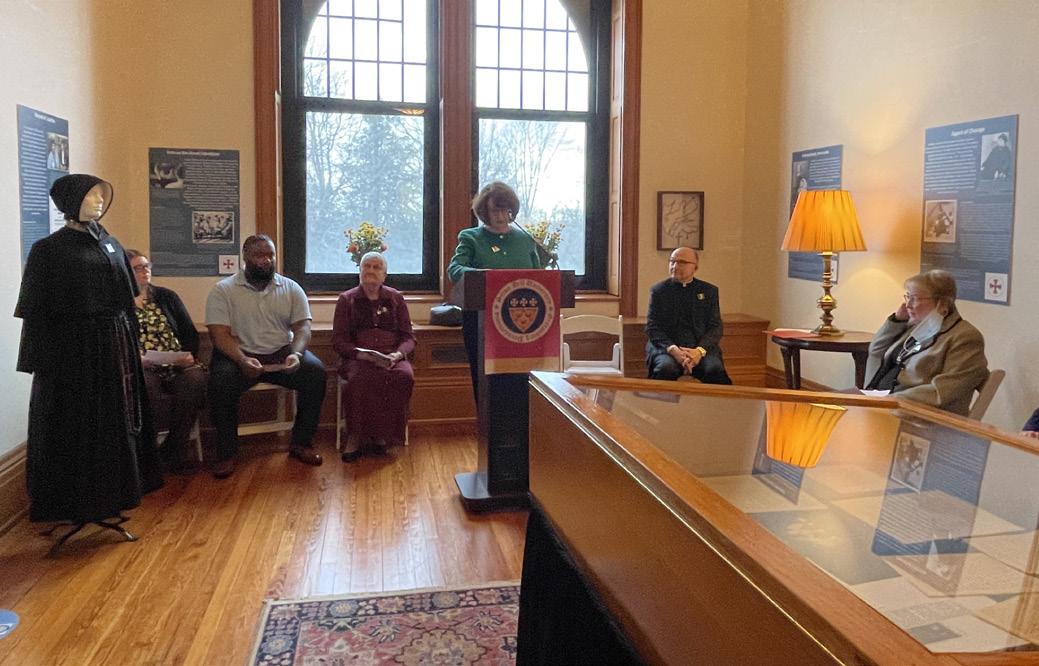
While becoming Chief Financial Officer of UPMC at age 39 wasn’t something that Rob DeMichiei expected, the steps he took get there began early in his career. The Seton Hill Trustee spoke to the audience of students, faculty, staff, and alumni both in person and via Zoom in April during this year’s Farrell Lecture, an annual lecture series made possible by a leadership gift in 2007 by the Farrell Family Foundation of Pittsburgh. Seton Hill University’s School of Business and the Wukich Center for Entrepreneurial Opportunities, in partnership with the university’s Alumni College, sponsored the event, held in Cecilian Hall. His presentation, titled “Leadership Lessons for the Next Generation,” touched on his takeaways from the leaders he encountered during his 35 years in Corporate America and how he applied them to both himself and his teams. “There’s no overnight success,” DeMichiei said. “I’ve always pursued difficult assignments and difficult tasks so I could develop and grow and be the best that I could be.” After his 16-year tenure at UPMC, DeMichiei retired as Executive Vice President and Chief Financial Officer of UPMC at age 55. Earlier in
his career he held executive finance roles with the General Electric Company (GE) and Price Waterhouse. He is currently on the Seton Hill University Board of Trustees as Chair of the Finance and Business Affairs Committee and a member of the Executive Committee and Investment Committee. DeMichiei also serves on a number of other area boards. Though DeMichiei values his career, it wasn’t the only area of his life in which he committed significant time to being successful. “My greatest achievement, far more important than what you see on this screen, is the family I have,” he said. Dr. Debasish Chakraborty, Dean of the School of His family includes his wife Amy, Business, and Rob DeMichiei at the Farrell Lecture. their four children, and grandchildren. His son, Chris DeMichiei, is a 2014 graduate of Seton Hill University. “Invest in relationships. Everybody should plant seeds, the younger you are the more seeds you need to plant,” DeMichiei said. “Five years later, 10 years later, 20 years later – you look at all the seeds you’ve planted, the relationships you’ve developed and you’re going to see a forest.”
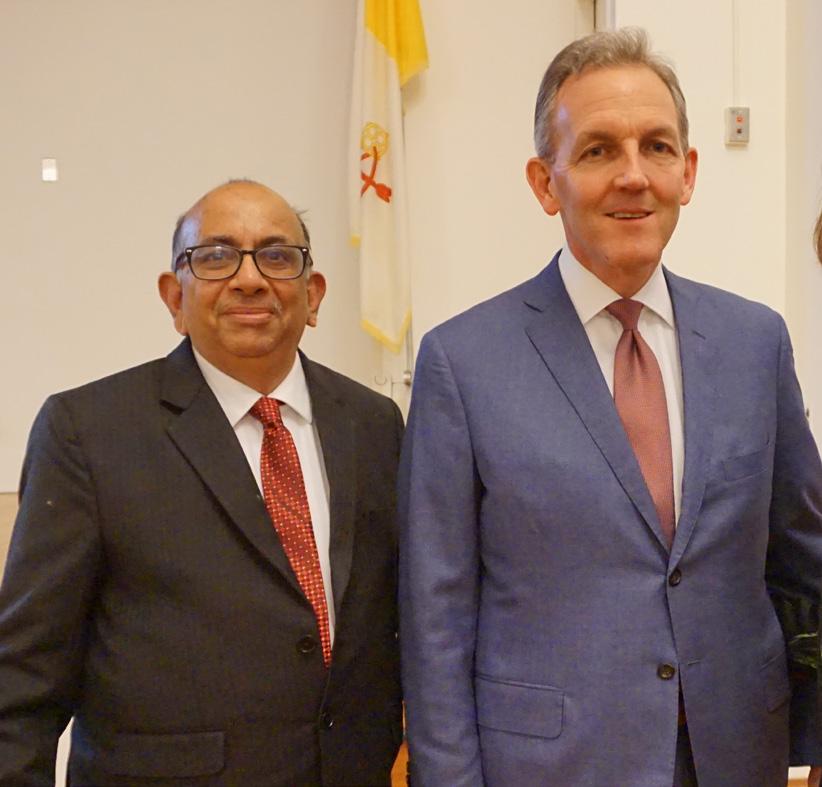
After four years of research and preparation, 20 students in the Seton Hill Honors Program presented their Senior Honors Capstone Projects during a symposium in April. Their research topics reflected their academic pursuits and interests and often aimed to reveal or offer solutions to a problem on campus, in the community or globally. "These projects are the result of student dedication to intellectual curiosity and a community of mentorship and support," said Dr. Christine Cusick, Director of the Honors Program. From helping people understand data collection and privacy concerns of the free web to examining the social climate surrounding the use of lethal force by law enforcement to a concert promoting women composers, the projects aimed to provoke thoughtful response and – at times – promote change. A sampling of the presentations follows.

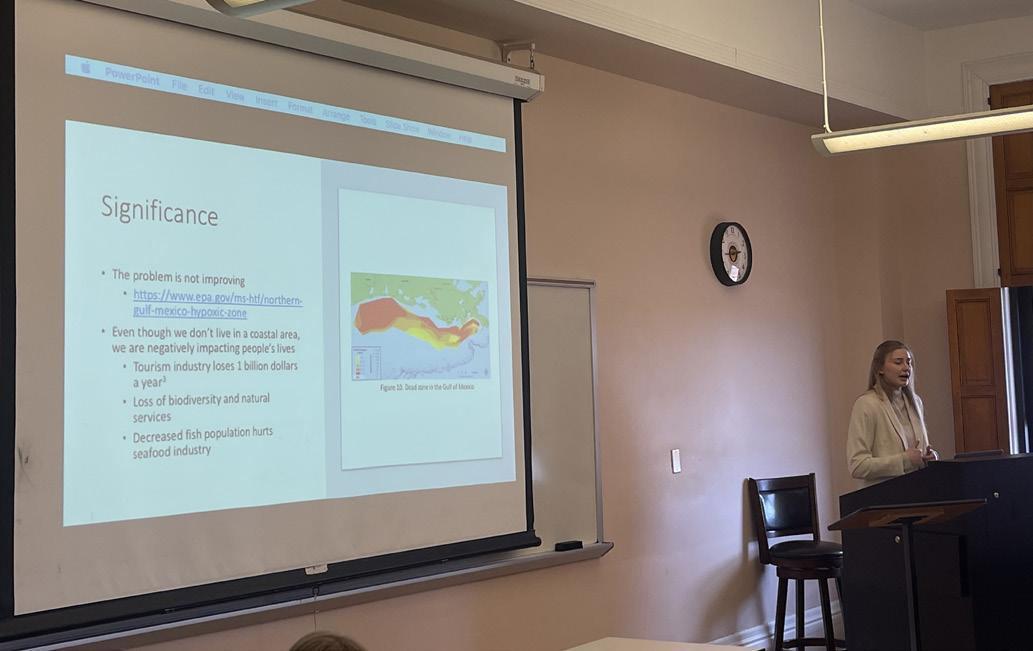
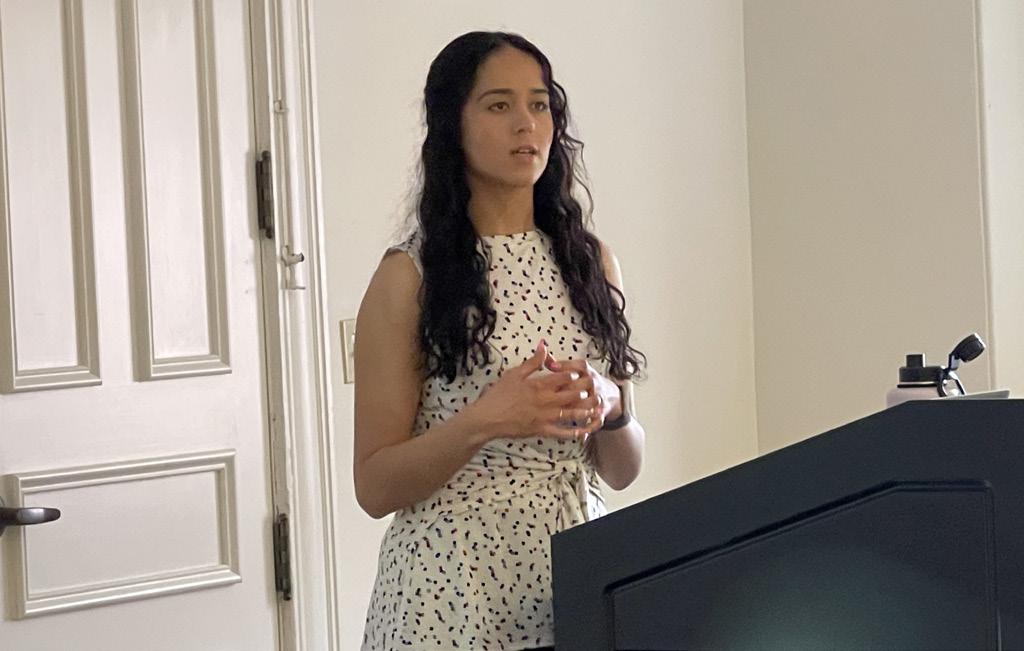
Chloe Walls presents her Honors Capstone Project "The Importance of Dental Health" to a room of faculty, staff and students. Wallsʼ research offered a look at the reasons why people neglect dental health, which is often related to fear and/or costs. She produced a guide for Seton Hill students that will be distributed by the Office of Health Services to help students find a local dentist who takes their insurance.
Alyssa Neast produced "The Study of Nutrient Pollution Produced by Seton Hill" and discussed the process where too many nutrients, often nitrogen and phosphorus, are added to bodies of water and can act like fertilizer, causing excessive growth of algae. Nutrients often run off of land where lawn and garden fertilizers are used.
Teresa Weickert presented on "Embracing Change: Mentoring and Emotional Intelligence," which discussed her efforts to provide diversity, equity and inclusion education at an area middle school.
Summer Blackʼs presentation "Returning to Postsecondary Education after Traumatic Brain Injury (TBI)" was a personal one. Summer suffered a TBI in a jet ski accident and struggled with a variety of issues when she returned to Seton Hill. Through the Office of Disability Services, she found the resources to help her complete her studies. She worked on suggesting improvements to the Disability Services website that would help students with disabilities that are unseen, such as TBI, get the assistance they need.


Faith McDowell’s Honors Capstone Project Includes Concert of Her Original Works
Faith McDowell wrote her first piano composition in the third grade and penned a musical in middle school. Through her Honors Capstone Project, the Seton Hill University Music Education major highlighted the importance of showcasing the work of women composers on both professional and educational stages. For her project, McDowell researched the lack of women composers overall – and the large gap that exists when it comes to their works being programmed at concerts. She presented her research findings – and 10 of her own compositions – at “Women Write Music Too!: Composition Premiere Concert” in April at the Seton Hill University Performing Arts Center’s Reichgut Concert Hall. “It was right up my alley to discuss the underrepresentation of women in music,” said McDowell, who will graduate from Seton Hill in December. During the first half of the concert, McDowell presented her research into women composers and then shared recordings of some of the instrumental works she has composed, performed by local ensembles. The second half of the concert featured live performances
of McDowell’s compositions – both instrumental and choral – by Seton Hill students and alumni. For her research, she surveyed choral and instrumental music directors at middle and high schools in western Pennsylvania and asked for programs from their past three years of concerts. From those programs, she tallied how many works were by male composers and how many works were by female composers. She found that only about 5.44 percent of works performed at regional high school and middle school concerts between 2018 and 2020 were written by women composers. That’s in line with a global study that found that while 13 percent of published composers are women, only about 5 percent are being actively programmed in concerts. She’s hoping that her research will make music directors more aware and more willing to program music by women composers. At the same time, she’s hoping her music will inspire other young women to Faith McDowell presented a concert of her original be composers. works as part of her Honors Capstone project. “For those who are interested in composing – yes, you can do this,” she said. “You can follow your passion. There are people who are fighting for you if you are underrepresented in this field.”

SHU Students Place Third in National Business Competition
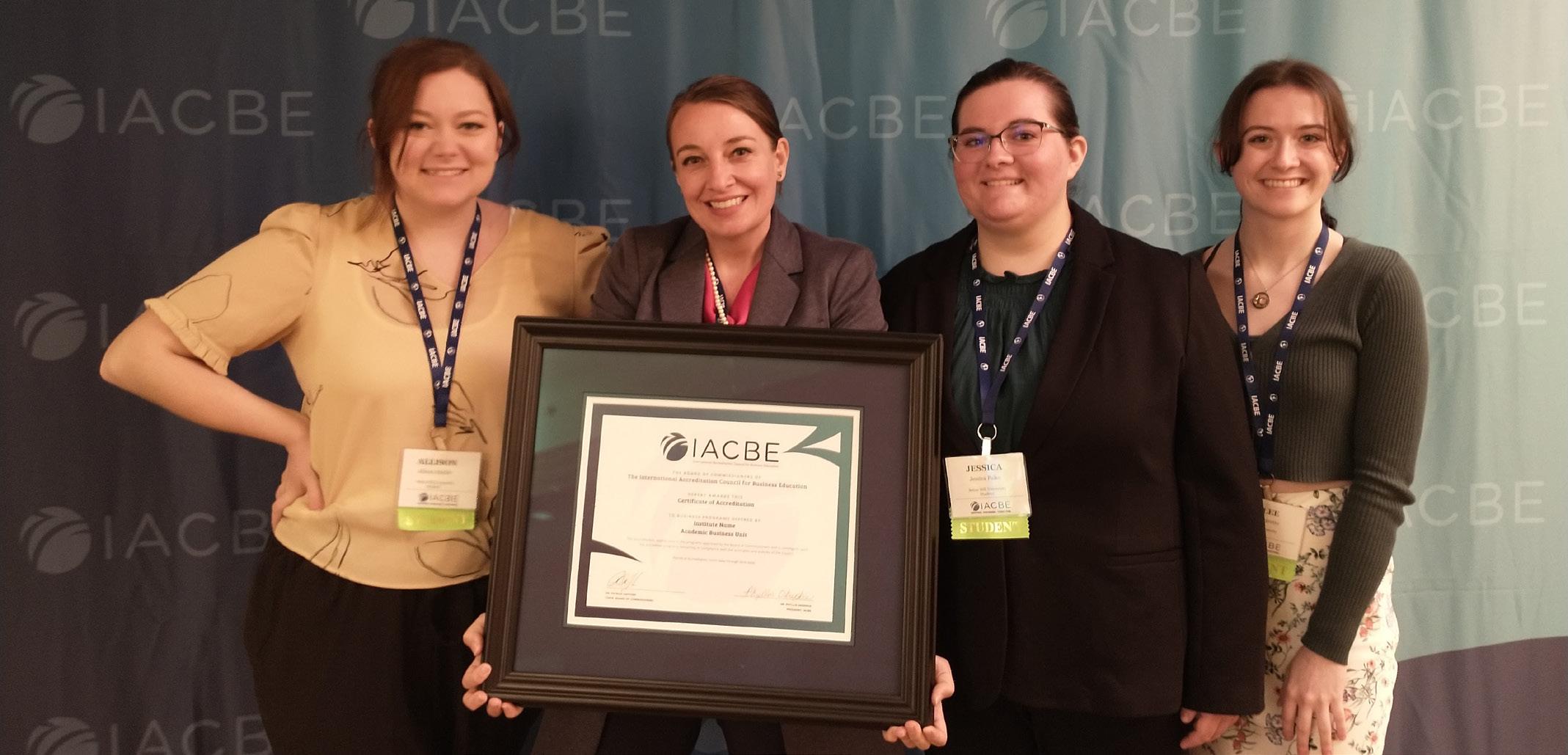
Allison Riddle, Associate Professor of Marketing and Communications Jen Jones, Kaylee Pivirotto and Jessica Palko with their third place award at the IACBE Student Case Study Competition in Costa Mesa, Calif.
Senior Allison Riddle, junior Kaylee Pivirotto, and freshman Jessica Palko had a real-world opportunity to test their business skills when they gave a marketing presentation to representatives from Donatos Pizza about how to reach Gen Z in Costa Mesa, Calif. The team of three communication majors tied for third place when they represented Seton Hill at the International Accreditation Council for Business Education (IACBE) Student Case Study Competition. The students were recruited for the competition by Jen Jones, Ph.D., Associate Professor and Department Coordinator of Marketing and Communications, who served as the team’s advisor. They spent a month researching their case, which was attracting younger customers to the existing Donatos Pizza brand that has skewed to older generations. The team came up with their first round of data by doing a literature review, citing more than 30 sources in their presentation. They then created a survey with a statistically significant number of Gen Z participants to further back up their strategy. “I was really proud that their idea was based in research and not just being a part of Gen Z,” Jones said. Weekly meetings where the Seton Hill team was able to interact with the other teams, competition hosts, and Donatos Pizza representatives were also part of the competition experience. The students’ strategy to evolve the brand’s identity to better reach Gen Z revolved around diversity and inclusion. Ideas for the campaign included: expanding corporate donations tied to specific causes around diversity, equity and inclusion; creating content and accompanying promotions around different holidays and celebrations throughout the year; and building community on social media by accommodating and showcasing different cultural perspectives. One example in their presentation came from one of the weekly meetings. After talking with the two women who were representing Donatos in the competition, the students developed the idea of highlighting women in the brand and their favorite products during Women’s History Month. “Overall, the experience was both insightful and fun,” Pivirotto said. “The process of research on my end helped enhance my writing and research skills.”
Once their preparations were complete, the team traveled to California to present their strategy to the Donatos representatives and members of local business communities in a Shark Tank-style competition. The students from Seton Hill comprised the only allfemale team in the competition. Though some of the teams had been participating in the competition for years before they earned a top spot, they were excited to place in the top three in their first year. “As someone in their first year of college it was a great experience being able to network with others that work in the same field that I want to work in,” Palko said. “Being at the competition and being able to present in front of the judges, some of whom came from Donatos, was very nerve racking, but it was worth all of the countless hours of work that my teammates and I put in.” While the experience of the competition was a first for all the team members, it wasn’t the only first for the students. For Pivirotto, traveling to California meant her first time flying and her first time leaving the Eastern time zone. “As a Spanish major and someone heavily involved in humanities, the cultural experience of being in California was amazing,” she said. Though it was a lot of work, and completed quickly, the students came away with a strong sense of accomplishment. “We gave it everything we could, and we are so happy to be able to bring home a win to Seton Hill and create a path for major change in Donatos,” Riddle said. “It was the best way to finish out my career at Seton Hill!” Jones was impressed with the students’ dedication to the competition on top of their studies, leadership activities, and jobs. She has since noticed elements of the students’ strategy appearing on Donatos’ social platforms. “I told them, ‘You are making a difference. You are transforming the world,’” Jones said.
The students prepared a presentation on how to attract Gen Z customers to the Donatos Pizza brand for this year's IACBE Student Case Study Competition.
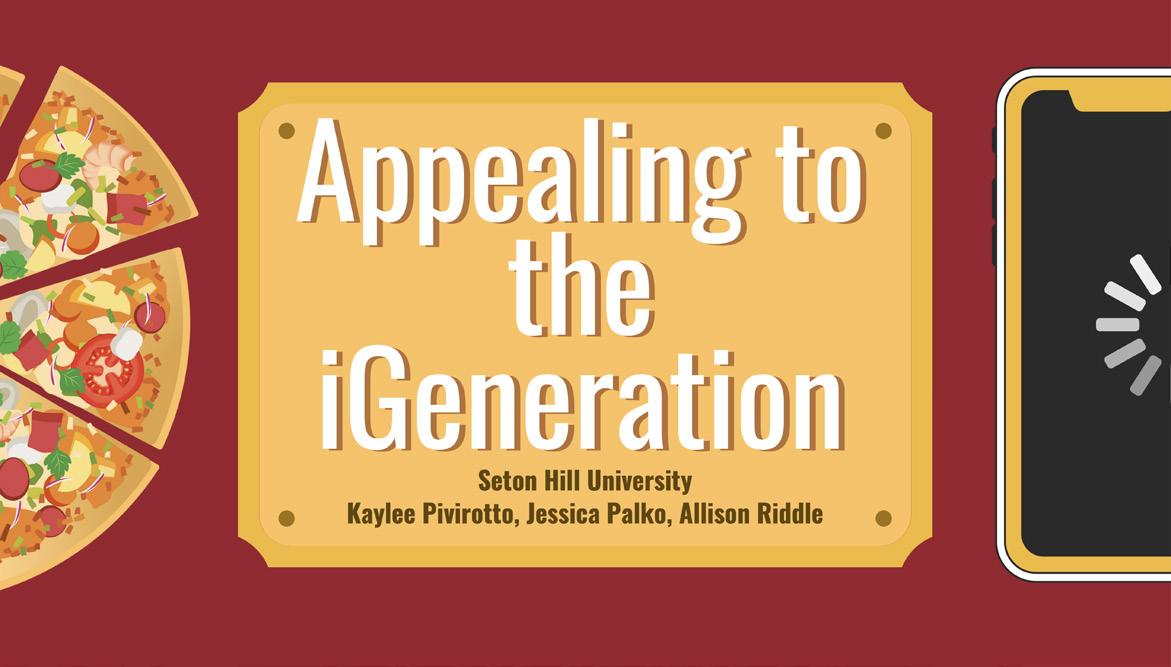
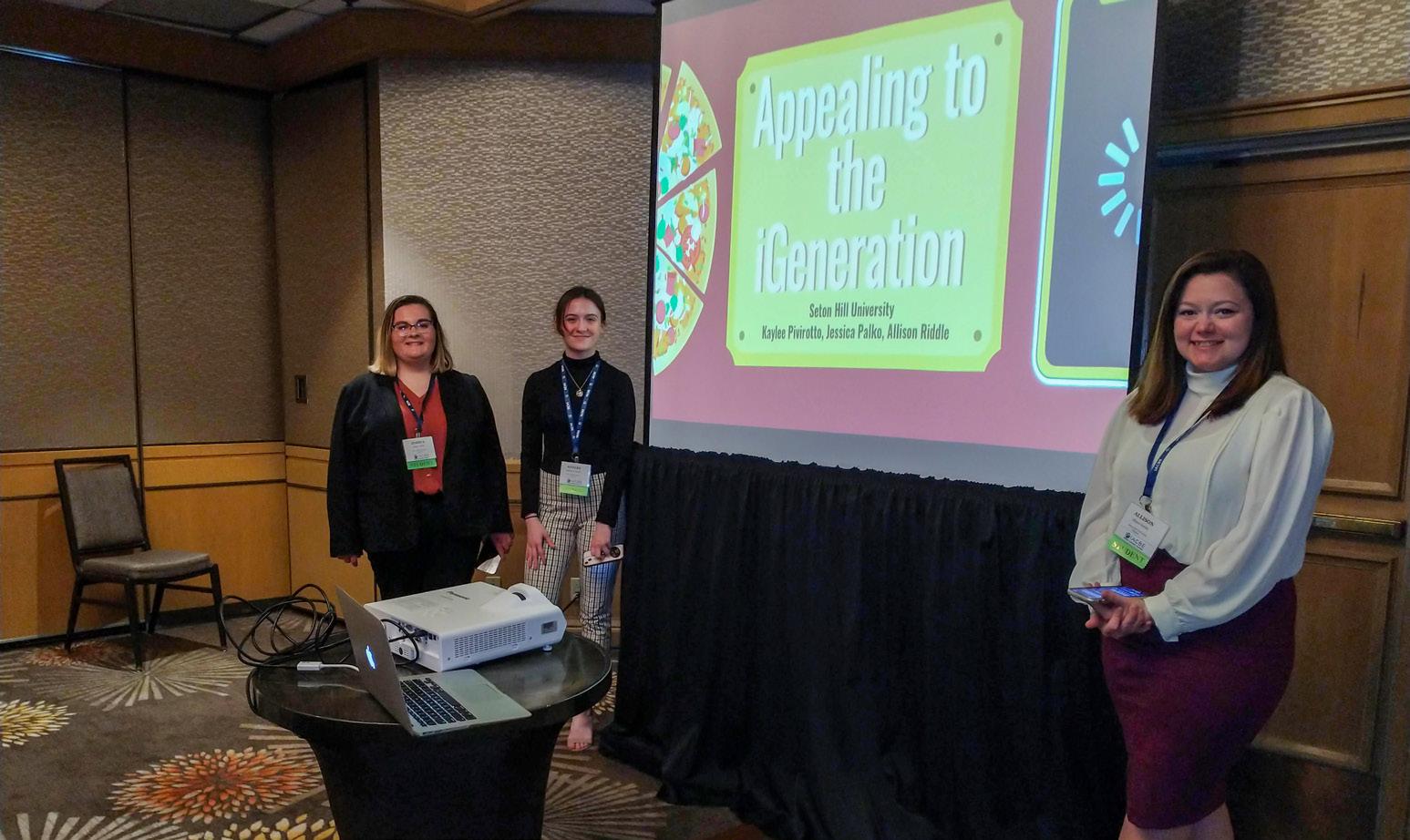
Students Jessica Palko, Kaylee Pivirotto, and Allison Riddle prepare to give their presentation in Costa Mesa, Calif.
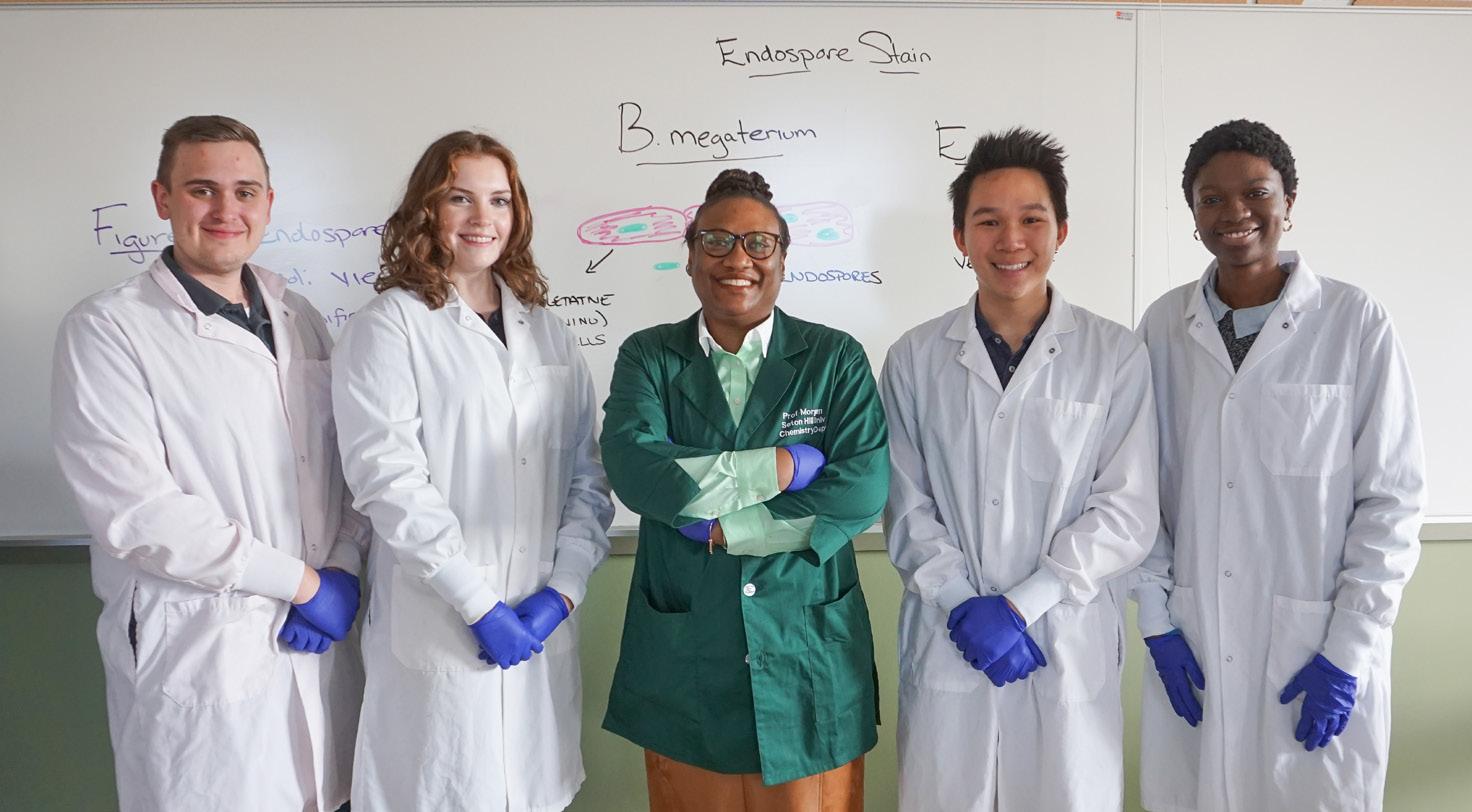
William Sheffler, Madison Kober, Dr. Amalene Cooper-Morgan, Matthew Nguyen and
Nana Agyepong The Future Scholars Program, initiated by Assistant Professor of Chemistry Amalene Cooper-Morgan, Ph.D., in Fall 2021, continued in the spring semester with four new Seton Hill students offering Science, Technology, Engineering and Mathematics (S.T.E.M.) lessons at area schools. Seniors Madison Kober and William Sheffler, who both graduated in May, junior Nana Agyepong and sophomore Matthew Nguyen worked with students in the Jeannette City School District and Penn Hills Charter School on various lessons and experiments. The program allows Seton Hill students in the sciences an experiential learning opportunity that allows them to expand their leadership abilities and provides students in Jeannette and Penn Hills the opportunity to engage in science with people closer to their own age. Kober, of Harrison City, Pa., and Sheffler, of New Stanton, Pa., who both majored in Biology in the cooperative Osteopathic Medicine degree program with Lake Erie College of Osteopathic Medicine (LECOM), developed lesson plans on blood typing and ocean currents. Agyepong, of Gaithersburg, Md., a
Biology major in the LECOM program, and Nguyen, of Morgan Hill, Calif., a Biochemistry major in the LECOM program, designed a lesson plan around acids and bases and tied them to impacts on the environment and everyday life. A lesson plan they developed on the cell cycle included an escape room activity. Future Scholars also volunteered at a Girl Scouts event at Westmoreland Mall that focused on S.T.E.M. The Future Scholars group all said the service aspect of the program drew them in. "I was looking for the opportunity to give back," Sheffler said. "Hopefully, I was able to inspire students to enter the S.T.E.M. field." Added Kober, "As student leaders, it's important to branch out further and look to the greater community." Agyepong said she was a student in a similar program when she was in middle school and wanted to be able to do the same for someone else. "The Future Scholars program gave me the opportunity to teach students something that interests me and gives the students a chance to engage more in science," she said. Madison Kober and William Sheffler help students in a Penn Hills Charter School classroom.
